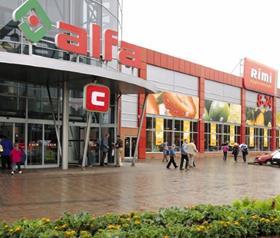
Until the global economic downturn really began to have an impact on consumer spending, a steady pattern of grocery retail sales growth and retailer expansion across eastern Europe was very much becoming the prevailing trend.
But as spending slows, so concern has increased that this growth will be impeded or even halted, and such adverse affects could potentially be more pronounced in emerging markets such as the three Baltic states – Lithuania, Latvia and Estonia.
The countries have long since moved out of the shadow of their Soviet past and retail analyses show that, if anything, the former Russian influence is being increasingly replaced by that of the nearby Nordic nations, particularly Finland.
According to Milos Ryba from analyst Planet Retail, three Finnish retailers currently boast significant market share in the Baltic countries: Rautakirja, Kesko and SOK.
Although Dutch retail group Ahold is also present in all three markets, it could easily be said to fit into the aforementioned category, given that its Rimi supermarket network is a joint-venture with Finnish retailer Kesko and is run through Ahold’s Swedish subsidiary ICA.
Ahold and Kesko, which also jointly control the Säästumarket and Supernetto discount chains in Estonia and Latvia respectively, remain the only foreign retailers of substantial size in the Baltics, although French-owned Casino’s Leader Price fascia does have a presence in Lithuania.
With the exception of Kesko and Ahold’s joint ventures, the discount sector is, interestingly, one that has so far been largely underdeveloped in the region. In fact, Germany’s Schwarz Group dropped plans to introduce its Lidl chain to Lithuania, Latvia and Estonia in 2006 without explanation.
However, by far the largest grocery retailer in the Baltic region is Lithuanian group Maxima, which has a 19.9 per cent overall market share across the countries and recorded retail sales in excess of €2m last year.
Maxima’s growth has taken place in tandem with steady grocery sales rises in all three nations. Lithuania – the largest of the Baltic states – recorded retail sales topping €5.7m last year compared with €3.8m in 2005, while Latvian retail sales rose to €3m in 2008 compared with €1.9m two years’ earlier. In Estonia, the smallest of the three nations, grocery sales also saw an increase, from €1.1m in 2005 to some €1.6m last year.
Lithuania’s grocery retail market landscape – both in terms of hypermarkets and supermarkets – is dominated by Maxima, although Ahold’s Rimi subsidiary also has a large share of the market. However, Planet Retail believes that this near-monopoly could soon be challenged to a greater extend than in the past following the market entry of Finnish hypermarket operator SOK in 2008, which plans to open six outlets in Lithuania’s capital Vilnius.
Maxima and Rimi also dominate hypermarket and supermarket retailing in neighbouring Latvia, although the country’s discount sector is growing fast in the form of Ahold-Kesko’s Supernetto joint venture and Casino’s Leader Price format, which has been franchised to Lithuanian retailer IKI.
Unsurprisingly, Rimi and Maxima both have strong presences in Estonia, although Finnish retailer SOK – through its Prisma fascia – and domestic retailer Selver are also competing for market share. However, with average income levels still relatively low in the country, independent neighbourhood stores continue to remain strong across Estonia, particularly in rural areas and small towns. In this latter case, many independent stores are grouped together under Estonian national consumer cooperative ETK.
But, despite the fact that the countries have experienced successive increases in grocery sales over recent years, Mr Ryba said that the global economic crisis is set to bring an abrupt halt to this trend.
Retail sales and consumption levels are expected to fall over the next few years, although the analyst believes Lithuania’s strong economic growth during this decade will mean that it is less affected by the economic downturn than the neighbouring two nations.
However, he does believe that the crisis will mean a temporary halt to outside investment.
“These three countries are being heavily affected by the current financial crisis, so we don’t expect other global retailers to expand to the Baltic region in the near future,” Mr Ryba added.



